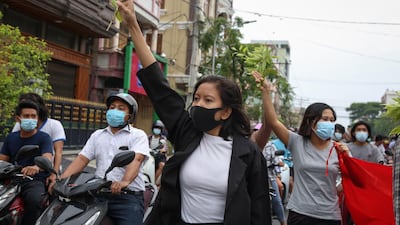As the protests and violence in Myanmar drag on, opponents of the country's military coup have announced that they're forming a national unity government.
The new political entity will include ousted members of parliament, protest leaders, and representatives from ethnic minorities.
They say their aim is to remove the military from power, and restore democracy.
The aspiring transitional government hopes to win international recognition.
Myanmar has been in crisis since the February 1 coup. The leader of the toppled civilian government Aung San Suu Kyi, remains in detention.
More than 700 people have been killed, according to a monitoring group.
The unity government's minister of international cooperation, Dr Sasa, who goes by one name, said that the country's last elections should have been seen by the military as legitimate.
"We are the democratically elected leaders of Myanmar. It was a free and fair 2020 election, and it was democratic.
"So, if the free and democratic world rejects us, that means they reject democracy, it's very simple. That means they reject the people of Myanmar"
Mr Sasa added that the objective was to end violence, restore democracy and build a "federal democratic union".
A spokesman for the junta could not be reached for comment.
Before the coup, Ms Suu Kyi's government had held power for five years and was starting its second term, following a landslide election victory back in November.
The generals have justified their takeover with accusations of election fraud – something the electoral commission has dismissed.
Western powers have imposed some sanctions on the military, though the generals have a long record of dismissing what they see as outside interference.
This could well be the message of junta leader General Min Aung Hlaing when he joins a special summit in Jakarta next week.
The meeting of the 10-country bloc of the Association of Southeast Asian Nations (ASEAN) is expected to address the ongoing crisis in post-coup Myanmar, and will be on April 24 in Jakarta. But the bloc has been increasingly opposed to the actions of the junta as the death toll has mounted.
Prisoner amnesty
News of the junta leader's attendance comes the same day the country's prisons are set to release more than 23,000 prisoners nationwide.
Myanmar typically grants an annual amnesty to thousands of prisoners to mark its traditional Buddhist New Year holiday – which in previous years have been joyous affairs with city-wide water fights.
But this year, anti-coup activists have used the holiday as an opportunity to protest the growing death toll and mass arrests.
A prison official told AFP on condition of anonymity that jails across the country will start freeing more than 23,000 people.
"We will release more than 800 prisoners from Insein prison" in a commercial hub Yangon, he added, declining to elaborate.
In February, the junta released a similar number of prisoners, with some rights groups at the time fearing the move was to free up space for opponents of the military as well as cause chaos in communities.
The junta has also issued nightly arrest warrants on state-run media, targeting celebrities, influencers, journalists and prominent activists with large social media followings.
By Friday night, the tally of arrest warrants for high profile figures had reached 380.













